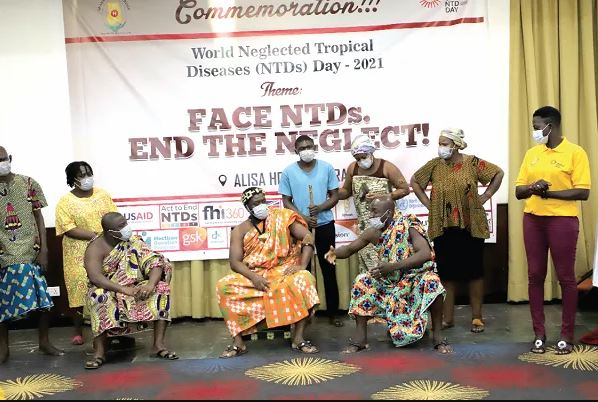
[ad_1]
Ghana joined the world in celebrating the second World Neglected Tropical Disease (NTD) Day, with a call on the government to increase funding and allocate more resources to eliminate NTDs.
This became necessary because efforts and initiatives to eradicate the disease depended solely on foreign aid.
At a ceremony in Accra to observe the day, Ghana Health Service (GHS) Director General Dr Patrick Kuma-Aboagye said NTDs cause significant morbidity and mortality worldwide.
Neglected tropical diseases are a group of an ancient disease that threatens an estimated 1.7 billion people living in the world’s poorest and most marginalized communities.
These diseases cause blindness, handicap or disfigure people and also affect the personal development of infected people.
Currently in Ghana, 14 NTDs, including trachoma, intestinal worms, river blindness, bilharzia, elephantiasis, sleeping sickness, Buruli ulcer, leprosy, yaws, are managed by the respective Ghana Health Service (GHS) programs.
Dr Kuma-Aboagye said more than one billion people, representing one-seventh of the world’s population, suffer from one or more NTDs.
“In Ghana, every district is endemic with at least two NTDs. Most of these illnesses do not kill but produce debilitating effects, including severe disfigurement, disability and blindness in patients, ”he said.
He said the diseases frequently overlapped geographically due to their strong association with poverty, so people were often affected by more than one disease.
“Prevention and control of NTDs are essential to end extreme poverty and interventions currently include preventive chemotherapy, case management of health education and awareness,” he said.
The Director-General said that apart from NTDs condemning those affected to live for many years with disabilities and stigma, they also prevent children from going to school, adults without work; households burdened with huge costs to seek treatment, communities trapped in endless cycles of poverty and cost developing economies billions of dollars each year.
He called for intersectoral collaboration to maximize resources and improve the effectiveness of NTD elimination interventions.
He noted that for better integration of NTD-related activities into the health system, a primary health care approach was essential while maintaining close interaction between programs to bring multiple health benefits to people in the health system. need.
The World Health Organization (WHO) Acting Representative for Ghana, Dr Neema Rusibamayila Kimambo, said treating affected populations and populations at risk for NTDs was a key strategy to achieve the third goal of sustainable development (GDG).
She said that with its efforts to leave no one behind, the WHO, in its 13th General Program of Work, aims to reach over one billion people with essential curative and preventive packages for all communicable diseases, including NTDs.
She commended Ghana for its progress in disease control and elimination despite limited resources.
World NTD Day is celebrated on January 30 each year around the world to raise awareness of NTDs and mobilize more attention, action and investment on priority issues in directly affected countries.
The theme of this year’s celebration was: “Confronting NTDs and Ending Neglect”.
Source link